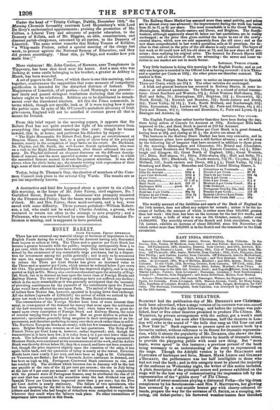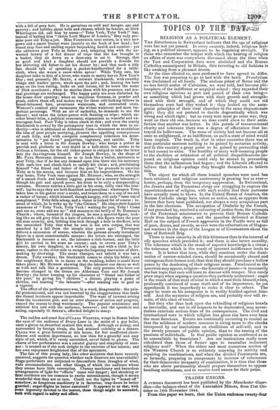TIIE THEATRES.
SCARCELY had the publication-day of Mr. DICKENS'S new Christmas- book been advertised, when a stage version of its contents was announced at the Adelphi for the night following ; and before the volume was pub- lished, four or five other theatres promised to produce The Chimes. Mr. WEBSTER, by private arrangement with the author, got a week's start of his competitors ; but soon after Christmas, half the theatres in Lon- don will echo to the sound of " the bells that rang an Old Year out and a New Year in." Such eagerness to pounce upon an unseen book by a favourite author, without reference to its fitness for dramatic representa- tion, while it attests the popularity of Mr. DICKENS, also shows the des- perate shifts to which managers are driven by dearth of dramatic talent, to provide the playgoing public with some new thing. But " more haste, worse speed" in this instance ; a previous perusal of the book being necessary to an understanding of the story as represented on the stage. Though the Adelphi version is by the BEAUMONT and FLETCHER of burlesque and farce, Messrs. MARK LEMON and GILBERT s'IlEcKErr, the performance was but half intelligible to those who had not read the book ; and in this category must be placed the majority of the audience on Wednesday night, the writer of this notice included. A plain description of the principal scenes and persons exhibited on the stage will be the best way of communicating the impression left by the representation of the "goblin story" of The Chimes. A band of street-musicians playing a dislocated Polka—the big-drum conspicuous by his facetiousness—and Mrs. F. MATTHEWS, her glowins. face screened by a coal-scuttle bonnet gay with cherry-coloured n- bands, prepare the way for the entrance of 0. &urn, as a stooping, tot- tering, old ticket-porter ; his furrowed weather-beaten face thatched with a fell of gray hair. He is garrulous on cold and hunger, age and poverty; and babbles about bells and chimes, which he fancies, as Dick Whittington did, call him by name—" Toby Veck, Toby Veck !" but, instead of hailing him "thrice Lord Mayor of London," they only pro- mise poor old Toby a job. Miss FORTESCUE next enters, in a nice new gown and a smart bonnet worn jauntily on the back of her head ; her round rosy face and smiling aspect bespeaking health and comfort : yet she addresses poor Toby as father ; and, tempting him with the un- wonted luxury of a hot dinner of tripe that she has brought in a basket, they sit down on a door-step to eat it Strange, that so good and kind a daughter should not provide a fireside for her shivering old father to eat his dinner by ; and that such a tidy lass should talk of spreading a pocket-handkerchief for a table- cloth, when she wears a snow-white apron! While Toby eats, his daughter talks to him of a lover, who wants to marry her on New Year's Day ; and presently Mr. SELBY, a stalwart blacksmith, with swarthy visage and leather apron, steals upon the pair ; and, leaning his bare arms on the iron railing, looks on and listens, till he hears the name of Dick mentioned ; when he startles them with his presence, and mu- tual greetings are exchanged. The happy party are soon disturbed by the house•door opening; when an imperious footman, in powder and plush, orders them off, and makes way for three odd-looking fellows in broad-brimmed hats, prominent waistcoats, and contracted coats. Wamirr's comical phiz surmounts the widest waistcoat and most im- portant personage. With an air of authority, he demands to see the dinner ; and taxes the ticket-porter with feasting on tripe; which an- other broad-brim, a political economist, stigmatizes as wasteful and ex- travagant food. Poor Toby is taken aback at this ; and even the sturdy blacksmith is cowed by the peremptory tone in which the man in an- thority—who is addressed as Alderman Cute—denounces as scandalous the idea of poor people marrying, pictures the appalling consequences of such folly, and with energetic complacency reiterates his deter- mination to "put down" pauperism, vagrancy, and suicide. Toby is sent with a letter to Sir Joseph Bowley ; who keeps a porter as peevish and plethoric as ever dozed in a hall chair, but seems to be without a footman, for the old ticket-porter is obliged to take the letter into the drawingroom himself. Sir Joseph Howley, in the shape of Mr. PAUL BEDFORD, dressed so as to look like a butler, announces to poor Toby, that if he has any demand upon him there sits his secretary with cash-box and check-book to satisfy his claim ; and, proclaiming himself "the friend and father of the poor," he proceeds to question Toby as to his means, and lectures him on his improvidence. On his way home, Toby Veck runs against Mr. Hunson ; who, on the strength of a smock-frock and leather leggins, passes for a country labourer,— though his gait and speech prove his dress to be only a masquerading costume. Hunsost carries a little girl in his arms, tidily clad like him- self; but he says they are both famished and penniless : whereupon Toby takes him to his garret over a stable, and treats them to a cup of tea and a rasher of bacon ; which himself, though hungry, will only " taste out of compliment." Toby falls asleep, and a vision is looked for of course ; in- stead of which, he is woke up by " the Chimes." He obeys their fancied summons of " Toby Veck, Toby Veck I waiting for you, Toby I Come and see us, come and see us!" and mounts to the belfry of St. Dunstan's Church ; where, instead of the ringers, he sees a spectral figure, look- ing like an old grey friar in a halo of cobweb ; this figure rates the poor old man soundly, and, bidding him look through a hole in the floor, tells the astonished Toby that what he sees is his own corpse, that was smashed by a fall from the steeple nine years ago ! Thereupon follows a succession of scenes, wherein the persons already introduced -figure is a most unaccountable manner : the lovers are estranged, the blacksmith is become a sot, the labourer a rick-burner, and the little girl he carried in his arms an outcast ; and, to crown poor Toby's misery, his own daughter, in a widow's cap and with a child in her arms, rushes to the river-side to escape the lingering starvation of shirt- making by drowning. The scene changes, and behold it was but a dream. Toby awakes ; the blacksmith comes to claim his bride ; and the neighbours flock in to dance at the wedding, before it could have taken place ; Mr. HUDSON showing that the labourer can dance as well as walk and talk like a gentleman. The only persons who have not become changed in the dream are Alderman Cute and Sir Joseph Howley ; the latter keeping up his character of " friend and father of the poor," by giving his " children " a dinner, playing a game of skittles, and toasting " the labourer "—after sending one to gaol as a vagrant.
The effect of the performance was, in a word, disagreeable : the pain- ful predominated, and was not lessened by the exaggerations that made the dismal incidents appear improbable. The want of interest arising from the incoherent plot, and an utter absence of action and progress, caused the scenes to drag wearisomely. The popular sentiments and satirical hits told with the audience, however ; and the spectacle and acting, especially 0. Salines, afforded delight to many.



























 Previous page
Previous page